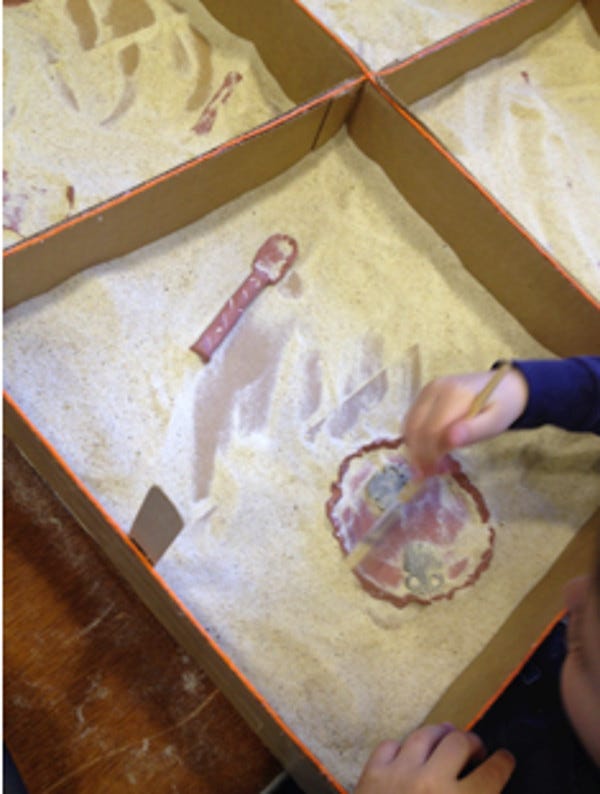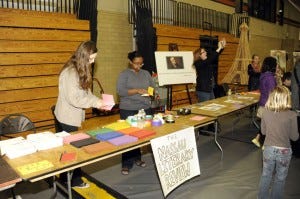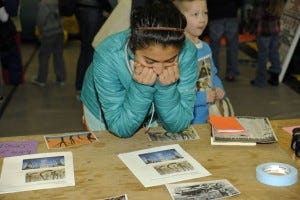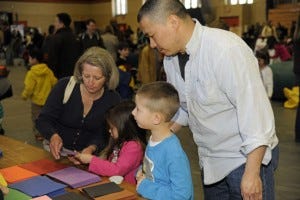Literature for Little Ones
Princyclopedia
April 6, 2013

Jules Verne’s Journey to the Centre of the Earth was the theme of this year’s ‘Princyclopedia,’ the annual “book convention” hosted by the Cotsen Children’s Library of the Princeton University Library. I did see a copy of the book while I was there volunteering at the dinosaur diorama table, but an hour into the event it had to be put away. With all the pencils, cardboard, paper and busy hands, there was not enough room at the table for props.
I found it strange, initially, that a book could be reduced to a prop at its very own event, but after spending the morning with children coloring psychedelic dinosaurs, climbing an inflatable “rock wall,” pouring red vinegar into volcanoes to watch them erupt, and touching earthworms, I changed my mind. A life-sized baby T-Rex with a pair of jeans coming out of his stomach roared a few yards off while I explained to a quiet boy how to put a box together to house his carefully drawn and cut out pliosaur and ichthyosaur. He was very young, most likely too young to read Jules Verne on his own. But he was not too young to be read to. Most importantly for this event, he was not too young to explore, imagine, and create.
The point of Cotsen’s ‘Princyclopedia’ is to “bring books to life,” but rather than attempting that through the characters or plot, it focuses exclusively on the world the story presents. Nowhere were the book’s characters even mentioned. Since 2007, when the event first kicked off with a day centered on Harry Potter, every year it has chosen a book or story with a rich world, usually imagined or at least embellished. 2008 saw the Middle East of Aladdin come to life. That day, there was a camel in Dillon Gym. 2009 invigorated the wackiness of Alice in Wonderland, 2010 was Treasure Island, 2011 The Lightning Thief and 2012 Robin Hood. This year, rocks, jewels, fossils, worms and plenty of craft materials piled into the gym to be touched, colored, smelled and sometimes tasted by the children of Princeton.
More than about the literary work, Princyclopedia is about exploration of the world and of the imagination. It is about stimulation and interaction. Although they were not conscious of it, the children that attended the event made many observations and connections as they were led through the gym; they developed memories that will connect to other experiences they will have later and that will contribute to the images of reality and unreality forming in their minds.
Although this seems like a childish way of approaching literature, it is not so different from what adults do. In most cases, we read to enjoy a writer’s imagination and sentiments. As we consume new stories and new worlds we recall similar stories and worlds. For some of us, what we read becomes fodder for our own creative endeavors. For others, what we read inspires us to find out more. Like a child who decides to investigate volcanoes for a science project because of that awesome eruption he saw in Dillon Gym, a person gets interested in visions of hell because of an encounter with Dante’s Inferno. There are also cases in which adults don’t pick up a book and read because they think they enjoy it but because their friend passionately recommended it or because they feel pressure to read a classic. Then, in the best case scenario, as we read that obligatory book we realize we like it.
Interestingly, this is not so different from the little girl who is told do a book report on The Adventures of Tom Sawyer and ends up remembering it as an integral part of her childhood. It turns out that the benefits of reading do not change as much as we think from Goodnight, Moon to Ulysses.
In its most basic iteration, literary consumption is oil for the mental machine. Even if one does not remember the story exactly, the impressions and feelings that come out of the experience will continue to float around, bringing enrichment to daily life. Princyclopedia brings this to light because it is literary consumption pared down to its basics. By cutting away the barrier between printed words, the images those words create in our minds and the reality those words reflect, the event evokes the sense of discovery one of the main reasons for reading. It is not surprising that it takes a return to the world of childhood to realize this.


